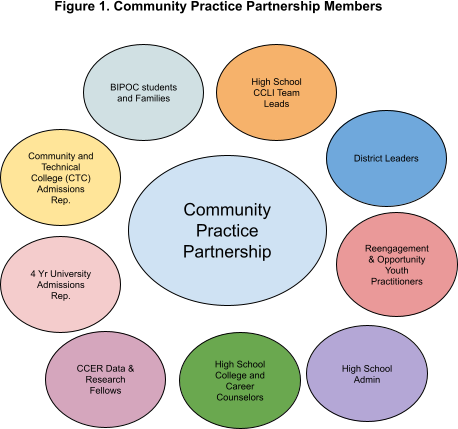The Community Practice Partnership (CPP) is a pilot initiative that brings together students, educators, college and career staff, school and district leaders, community-based organization(s), and college/university staff to co-create solutions that better support students in pursuing their post-secondary aspirations.
Designed to address the common issues that have been raised by students, families, and practitioners, this initiative seeks to increase post-secondary enrollment in Washington’s universities, colleges and trade programs, through a coordinated effort to redress fragmented pathways.
CPP members will have the opportunity to engage in a focused project whose overall goals are to:

This region is home to more than 122,000 K-12 students, and nearly 30% of the region’s 39,000 high school students identify as Black. Among the 1300+ Black high school students who responded to the 2020 College and Career Leadership Institute (CCLI) Student Survey1, 94% expect to pursue a postsecondary pathway. However, only 53% of Black 12th grade students who graduated in 2020 directly enrolled in a postsecondary institution. We see this difference between student aspirations and student outcomes as the true opportunity gap.
Transitioning from high school to college in Washington state is a deeply complex process, not just for students, but also for educators, policy makers, advisors and parents. Many factors contribute to this extremely complicated system including but not limited to the courses that high schools offer, the timing of student coursetaking, the use of transcripts for college level course placement and even down to the school district that the student attends. All of these factors make it extremely difficult for students to transition from high school to college with ease.
Black students are disproportionately affected by the aforementioned challenges across the education continuum. For example, only 16% of Black students were eligible to be placed in college level math at the CTC where they enrolled2. This could be due to a range of issues, including whether students took the course, the grade they received in the course, when they took the course and whether the college counted this coursetaking combination as college eligible. Furthermore, 2 in 5 Black CTC enrollees, who were eligible for college-level placement based on their high school coursetaking and grades were inappropriately placed in pre-college math3. Further, emerging policies that seek to support students may be exacerbating these inequities.
For example, the Graduation Requirement Emergency Waivers may have resulted in students graduating without the competencies to be prepared for college level coursework. Across our work, we’ve also heard directly from students that they need access to college-ready courses, stronger advising supports, more information about college placement in high school, and better support in transition to and upon arriving in college456
 The Community Practice Partnership (CPP) is a pilot initiative developed in response to the expressed needs of Black students and families throughout our region. This initiative seeks to increase post-secondary enrollment in Washington’s universities, colleges and trade programs, through a coordinated effort to redress fragmented pathways. Our priority focus in the Community Practice Partnership is to address the common issues that have been raised by students, families, and practitioners. The CPP will have the opportunity to engage in a focused project whose goals are to 1) improve high school advising support or 2) improve transition and college enrollment experiences among Black, Indigenous, and students of color.
The Community Practice Partnership (CPP) is a pilot initiative developed in response to the expressed needs of Black students and families throughout our region. This initiative seeks to increase post-secondary enrollment in Washington’s universities, colleges and trade programs, through a coordinated effort to redress fragmented pathways. Our priority focus in the Community Practice Partnership is to address the common issues that have been raised by students, families, and practitioners. The CPP will have the opportunity to engage in a focused project whose goals are to 1) improve high school advising support or 2) improve transition and college enrollment experiences among Black, Indigenous, and students of color.
CCER will support this project intensively to incubate this process – testing and modeling innovations and building the capacity of each system to sustain efforts. Our goal is that the target school, district, and or college adopts transformative policies, practices and programs to ensure that Black students thrive throughout their educational journey and beyond. CCER will continue to provide backbone infrastructure support (e.g., data, reporting, annual or quarterly convenings) to inform these practices with learnings from the pilot and subsequent CPPs. Table 1 outlines potential projects that have been identified as focus areas for the CPP. Alternatively, the CPP may choose to develop a novel project that responds to the unique challenges within their contexts.
The CPP initiative will engage stakeholders in a process that is designed to mirror the four key components of the Equity Transformation Cycle (Figure 2); (1) Listen and cultivate awareness of student experiences; (2) Uncover root causes and build capacity to analyze street data (3) Reimagine and design in collaboration with Black students and families and (4) Move: to take antiracist, equity-driven action7. This approach diverges from traditional top-down methods in that it is iterative, centers relationships and establishes a collective learning environment that lays the foundation for effective collaboration. The CPP initiative hopes to work with school districts that have existing relationships with other CCER initiatives (CCLI and APPT). By leveraging existing strategies in a single school district, we hope to increase the overall impact on student outcomes. While piloting this model in a single school district, CCER’s data and research team, along with our data fellows will engage in rigorous research that informs the scalability of this model to other districts across the Road Map region.
Table 1. Potential CPP Project Options
| High School Advising & Supports | |
|---|---|
| Project A | High School & Beyond Planning |
| Project B | Equitable Access to Courses and Course Planning |
| Transition and College Enrollment Experiences | |
| Project C | College Acceptance & Transition |
| Project D | College Course Placement |
Project A. High School and Beyond Planning: Projects in this area may focus on increasing the utility and efficacy of the HSBP, possibly adding components that would address student requests related to financial literacy and financial aid planning, for example, tying it to advising and/or advisory content and course planning, etc.
Project B. Equitable Access to Courses and Course Planning: Projects in this area could interface with the course planning project described in the “Data System Development and Modernization” section above.
Project C. College Acceptance and Transition: Projects in this area could include transparent and consistent 4-year college acceptance requirements; understanding and implementing components of successful CBO partnerships; identifying and resourcing supportive financial services; uncovering and addressing key drivers of summer melt; or improving communication & transcript submission systems between feeder high schools and colleges.
Project D. College Course Placement Teams: Projects in this focus area could do a deep dive to implement recommendations outlined in Inequity by Design – or address other issues that students experience with college course placement – within their own context. While the above focus areas are suggested in response to student requests and supporting research, Community Practice Partnerships may elect other focus areas that are most relevant to their own context and align to their goals.
This strategy emerged from the findings in the Inequity by Design report which demonstrates the ways that policies and practices perpetuate institutional racism and maintain systems of inequity throughout every aspect of a student’s educational journey. In recognizing the deeply rooted nature of racism within public school systems, the research and rationale underlying this strategy puts into action the ideas and methods identified in Street Data: A Next-Generation Model for Equity, Pedagogy and School Transformation. Grounded in decolonial research practices that uplift notions of holism and relationality (everything is connected), Street data offers a student-centered approach to addressing inequities in school systems. A key stance foregrounding this approach is intentionally centering the voices and experiences of students and families that have been historically excluded (i.e. choosing the margins).In this work, choosing the margins means that we center the voices of Black, Indigenous, Latinx, LGBTQ and Two-Spirit students. Likewise, the voices and perspective of Opportunity Youth and reengagement providers will be a cornerstone of the CPP initiative.
CCER is well-poised to lead the CPP. We have learned from students about their experience in high school, college, and reengagement programs. Through our longitudinal data warehouse, we have developed analytic and reporting products that complement these learnings with tools that provide insight into high school course taking, college enrollment, college course-taking, and progress. Through our community and family engagement, we have learned about the necessary conditions for equitable engagement. Finally, our impact teams bring vast experience in building the capacity of high school teams and reengagement providers in improving student programs and college and career readiness practices.
CCER will support this project intensively to incubate this process – testing and modeling innovations and building the capacity of each system to sustain efforts. Our goal is that the target school, district, and or college adopts transformative policies, practices and programs to ensure that Black students thrive throughout their educational journey and beyond. CCER will continue to provide backbone infrastructure support (e.g., data, reporting, annual or quarterly convenings) to inform these practices with learnings from the pilot and subsequent CPPs.
Several of these potential project options have current relevance in the larger state context. Washington Senate Bill 5030, enacted in 2021, calls for the implementation of comprehensive K-12 school counseling to guide students in academic pursuits, career planning, and social-emotional learning. Senate Bill 5243/House Bill 1273, introduced in the 2023 legislative session, asserts that each student must have a High School and Beyond Plan (HSBP) that guides their high school experience and informs course taking aligned with their postsecondary goals. Included in this bill is the provision that OSPI will conduct a cost analysis and feasibility study by September 2024 to inform a potential statewide HSBP platform. Concurrently, the Washington Student Achievement Council is interested in conducting a deeper review of the CADRs guidelines (College Academic Distribution Requirements – the requirements to apply to a Washington State public 4-year college). Learnings from the CPP could inform these statewide initiatives.